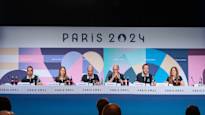PARIS. A man runs from the back of the meeting room to the front with a large camera and starts filming a Chinese female journalist.
The information conference of the anti-doping organization International Testing Agency, or ITA, about the doping testing of the Paris Olympics is underway in the international press center.
The ITA staff has just presented figures from the swimming doping tests carried out before the Games. One country stands out from the rest.
Since January 1, 618 doping tests have been performed on Chinese swimmers. 389 of them were made by ITA. In practice, the remaining 229 tests belong to Chinada, the Chinese anti-doping commission. The second most tested athletes are in the United States, with a total of 280 doping tests. Of these, ITA’s share is 69.
According to ITA, 200 tests have been done on Chinese people in the last ten days alone. A Chinese reporter starts reading.
– What is this large number of the last few days based on and does it affect the athletes’ preparation? Some have said that they had to wake up between 5 and 6 in the morning in the middle of an important rest phase. Could you answer this? a Chinese journalist asks.
When the question has been asked, the man who filmed the journalist from the front leaves back to the back of the auditorium to the place intended for photographers.
Red rose on one or the other’s cheeks
In the hall, the question arouses amused reactions. No wonder.
First of all, early morning tests are a staple in professional sports. In this case, quickly eliminated substances do not have time to leave the athlete’s body. The athlete hasn’t had time to train either. If the athlete has trained, the blood test cannot be performed immediately after training.
Secondly, the cream of the crop of investigative journalists specializing in anti-doping journalism sits in the hall, for example from the ARD channel Hajo Seppelt and The New York Times Tariq Panja.
The duo revealed with their colleagues in the spring that 23 Chinese swimmers had given doping samples containing the banned trimetazidine in early 2021. However, the athletes got away without punishment. 11 of them will compete in Paris.
During the event, Seppelt and Panja have repeatedly discussed how ITA views the mass cartage of Chinese.
The Chinese reporter’s question is like from another reality and causes a kind of world record for anti-doping topics.
Even the unnamed high-profile anti-doping person sitting next to her gets red on the cheeks, even though the person’s employer did not seek punishment for the Chinese in the saga.
The ITA’s response to the Chinese journalist is briefly stated: there is nothing abnormal about the morning testing, and considering the events of the last months, the testing of the Chinese is a prerequisite to restore the confidence of the international swimming community.
Stalemate
On Thursday, however, it becomes clear that there is no trust. The Olympic swimming in Paris starts on Saturday in an extremely tense atmosphere.
In a nutshell, the situation is as follows.
The International Swimming Federation Fina, the World Anti-Doping Agency Wada and ITA and the Chinese Anti-Doping Agency Chinada have accepted the report given by the Chinese security authorities.
According to it, 23 Chinese swimmers got the banned trimetazidine in their system as a result of contamination, i.e. pollution, while staying in a hotel during a competition trip. Chinese security officials collected the alleged evidence from a hotel kitchen more than two months after the athletes provided samples containing trimetazidine.
The other party, i.e. several western star swimmers and national anti-doping agencies, led by the US, have questioned the activities of the aforementioned anti-doping agencies in the case.
The main focus is on Wada, which relied on the report provided by the Chinese authorities without the requirement to conduct its own external investigation.
Wada has argued that conducting the investigation would not have been possible in China during the corona era. Wada did not appeal to the International Court of Appeal for Sport, Cas, when Chinada and the International Swimming Federation decided not to charge the Chinese swimmers.
Those who are critical of the case have not received answers to the following questions. How did trimetazidine end up in the kitchen? How was it possible that traces of a banned heart drug can be found months later in the disinfection frenzy of the corona era in spice jars, a range hood and a cesspool? Or who did the prescription heart medication belong to?
Report made public?
The ITA is responsible for doping testing at the Olympic Games in Paris, but it started as a doping supervisor for international elite swimming in 2022 – i.e. a year after the Chinese saga. ITA says that it has conducted its own investigation on the subject and reached the same conclusion as Wada. However, neither opens their investigation in detail.
The focus of the investigation is the report of the China National Anti-Doping Agency, Chinada. The report is in the possession of German investigative journalist Hajo Seppelt.
ARD has repeatedly asked Wada to publish Chinada’s report, but Wada has not agreed to the request.
Seppelt tells Urheilu that ARD is considering publishing the report in the near future.
– Everyone can then see that Chinada’s report does not contain anything fact-based, but is full of mere assumptions. An assumption is not a proof, says Seppelt.
On Thursday, however, the anti-doping authorities will not find anything to change in their activities. The day started with Wada’s information and ended with ITA’s information session.
In between, the United States and Australia, the two biggest swimming nations, held their own events. In them, the star athletes’ message was clear: they are not going to sweep the issue under the carpet.
They’re not going to forget.
